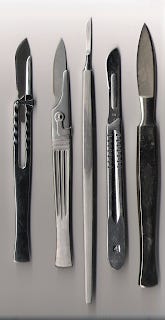Am I Having a Gallbladder Attack?
Just because you have gallstones doesn't mean you should rush off to the operating room.
Gallbladder removal, known as cholecystectomy, is one of the most common surgical procedures performed. Over a million Americans will give up their gallbladders this year. The most common gallbladder symptom is abdominal pain, which is usually caused by gallstones. There are other reasons that gallbladders are removed, which I will leave aside in this post.
It’s very gratifying for physicians when a patient enjoys a pain-free life after gallbladder removal. However, every gastroenterologist and general surgeon has seen patients whose abdominal pain lives on after cholecystectomy. This is a frustrating scenario primarily for patients but also for the medical professionals. Some of these disappointed patients had consulted with numerous physicians for advice on their abdominal pain. Did all of these physicians mess up? How could this happen?
Of course, physician error can never be excluded, since we doctors, like everyone, are flawed members of the human species.
However, just because pain persists after the operation doesn’t mean that the decision to operate was wrong. Understandably, this can be a challenging reality for patients and families to grasp. If a medical treatment doesn’t work, then a patient might conclude that the medical advice was wrong. As a reminder, there are no guarantees in life or in medicine.
Here are some reasons why a patient’s abdominal pain persists after gallbladder removal.
The medical professionals should have recognized that the abdominal pain described was inconsistent with gallbladder pain. Other diagnostic possibilities should have been considered.
Although the patient had gallstones, the symptoms were caused by an ulcer or some other condition. Most patients with gallstones never suffer symptoms from them. Just because a patient with gallstones had stomach aches doesn’t mean the two are connected.
The patient is frustrated after multiple emergency room visits for unexplained pain and insists on cholecystectomy because his cousin had the same symptoms and was cured after surgery. A reluctant surgeon acquiesces.
The physicians performed a meticulous evaluation, and all data were highly consistent with gallbladder disease. Despite this due diligence, surgery had no effect on the pain. Excellent medical judgment cannot guarantee the desired and expected outcome.
The best chance of having your gallbladder be correctly blamed or excluded from consideration will come from a thorough evaluation of your medical history—in other words, your narrative. Don’t let the presence of gallstones lure you erroneously into the operating room. Your physician should be engaging in a detailed dialogue about your pain and other relevant symptoms. No stone should be left unturned.



There are other solutions than cholecystectomy:
https://goscopehealth.com/
https://youtu.be/I2k5qu5Jnhk
A year ago (July 2024), my 4cm (asymptomatic) gallstone was removed by Organ Sparing Gallstone Removal at MedStar Hospital in Washington, D.C.
I am doing well. I had a 1-year follow-up ultrasound last week that showed the gallbladder free of gallstones. I don't expect them to return.
Very true and a fine example of patients sometimes not knowing what is best for them. The opposite occasionally occurs as well. I had a patient with classic gallbladder pain but a “normal” ultrasound and CT. Her scan showed a hyper dynamic gallbladder. Also not generally consistent with GB disease. She insisted on cholecystectomy and lo and behold had many tiny stones. Post op her pain was gone!